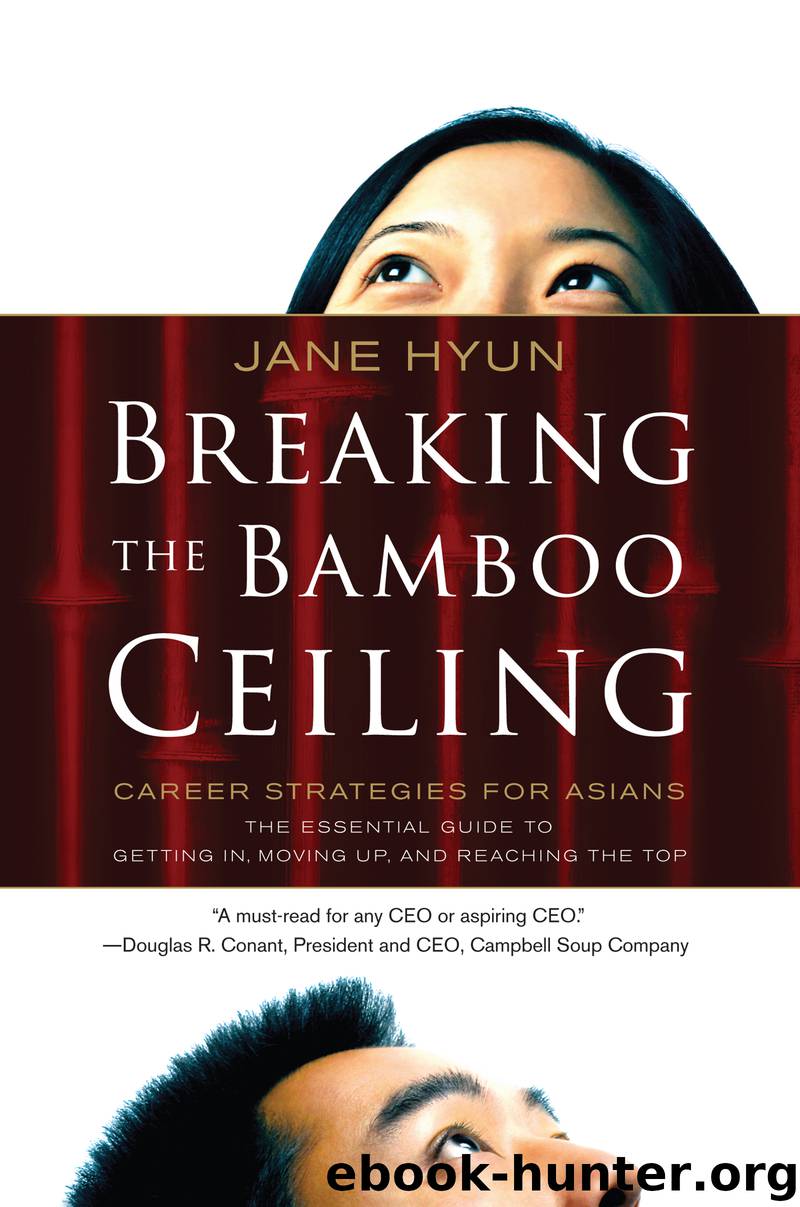Breaking the Bamboo Ceiling by Jane Hyun

Author:Jane Hyun
Language: eng
Format: epub
Published: 2019-04-08T16:00:00+00:00
The study also revealed that these values were not found to differ significantly across generations since immigration. There is a remarkable gap in Asian Americans’ behavioral acculturation—regarding such issues as food, clothing, and language use—and values acculturation when transitioning to a new culture. Asian immigrants may seem to readily adopt Western ways of living, but their deeply ingrained Asian values, many inherited from Confucian values, are so fundamental to who they are that they and future generations are very slow to change.
This may explain why even more acculturated second- and third-generation Asian Americans feel burdened by the values of their parents and grandparents and proclaim themselves “bananas” (Asian on the outside, Caucasian on the inside—Asians who have little or no identification with their Asian heritage). In many ways, this theme of conformity versus individuality is at odds with the objectives of America’s founders. Because culture, Asianness, and Americanness are difficult to measure with precision, and because many cultural values are shared by diverse groups, Asian Americans may have difficulty deciphering which of their values are “American” and which are specific to their Asian background. Managing these bicultural and sometimes conflicting values can be so stressful that some Asian Americans wind up rebelling against or resenting one of their cultures.
Confucius also said, “A young man should serve his parents at home and be respectful to elders outside his home.” Even if someone is just a few minutes older, he or she commands respect and authority in some Asian cultures. Asian children are sometimes taught to speak softly and not raise their voices, especially to those in authority. Respecting elders also affects body language, as it is customary in many Asian countries to cast your eyes downward in deference; direct eye contact is not always favored. In the United States, however, lack of eye contact may connote dishonesty, shiftiness, or lack of assertiveness.
In many Asian countries, the children or grandchildren care for their parents and grandparents, and quite often, that tradition is carried on by Asian Americans. This unwavering devotion to elders and superiors can be transferred to the workplace, regardless of how malevolent or incompetent superiors may be.
Download
This site does not store any files on its server. We only index and link to content provided by other sites. Please contact the content providers to delete copyright contents if any and email us, we'll remove relevant links or contents immediately.
| African-American Studies | Asian American Studies |
| Disabled | Ethnic Studies |
| Hispanic American Studies | LGBT |
| Minority Studies | Native American Studies |
Cecilia; Or, Memoirs of an Heiress — Volume 1 by Fanny Burney(32558)
The Great Music City by Andrea Baker(32019)
Cecilia; Or, Memoirs of an Heiress — Volume 2 by Fanny Burney(31956)
Cecilia; Or, Memoirs of an Heiress — Volume 3 by Fanny Burney(31942)
We're Going to Need More Wine by Gabrielle Union(19046)
All the Missing Girls by Megan Miranda(16030)
Pimp by Iceberg Slim(14508)
For the Love of Europe by Rick Steves(14121)
Bombshells: Glamour Girls of a Lifetime by Sullivan Steve(14077)
Talking to Strangers by Malcolm Gladwell(13370)
Norse Mythology by Gaiman Neil(13367)
Fifty Shades Freed by E L James(13243)
Mindhunter: Inside the FBI's Elite Serial Crime Unit by John E. Douglas & Mark Olshaker(9344)
Crazy Rich Asians by Kevin Kwan(9292)
The Lost Art of Listening by Michael P. Nichols(7506)
Enlightenment Now: The Case for Reason, Science, Humanism, and Progress by Steven Pinker(7314)
The Four Agreements by Don Miguel Ruiz(6765)
Bad Blood by John Carreyrou(6622)
Weapons of Math Destruction by Cathy O'Neil(6281)
